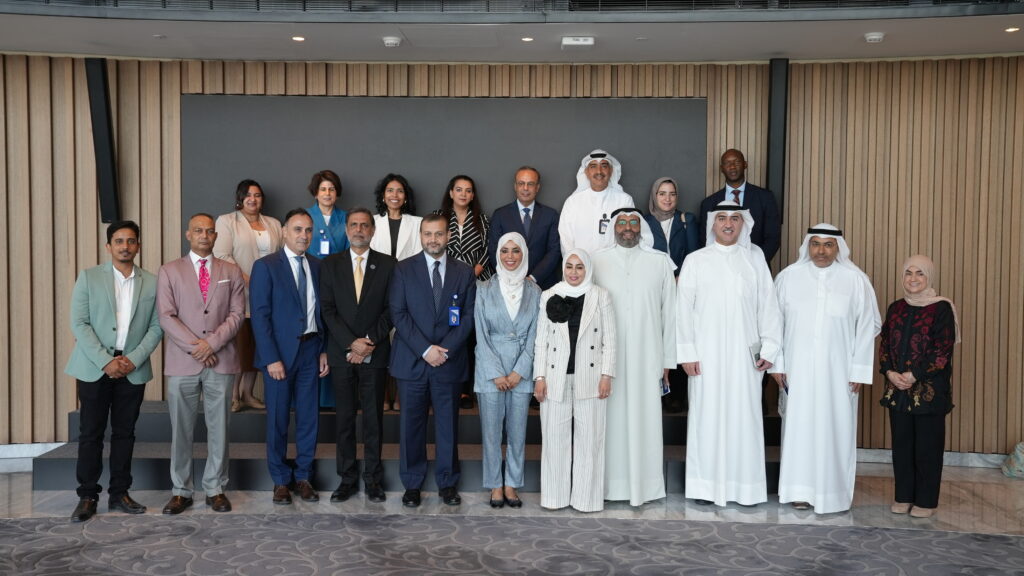11/06/2024
11/06/2024

Kuwait City, June 11: Marking World Environment Day, a delegation from the World Health Organization (WHO) Kuwait Country Office, and Kuwait Green Building Council (KGBC) paid a visit to National Bank of Kuwait (NBK’s) headquarters to tour the building which stands out as a notable example of environmentally sustainable practices that promote health and well-being.
The tour aimed to showcase environmentally sustainable building practices and advocate for the links between the built environment and good health.
It featured a group of decision-makers and specialists in urban sustainability, including members of the Municipal Council, representatives of Environment Public Authority (EPA), the Ministry of Health, and WHO Healthy Cities Initiative, in addition to researchers specialized in sustainable building from Kuwait University and the Kuwait Institute for Scientific Research (KISR), and representatives of UN agencies in Kuwait.
The tour, which saw the participation of 22 officials and specialists, aimed to highlight environmentally sustainable urban practices that have a positive impact on human health.
The participants discussed the best ways to promote green building practices among institutions and individuals for good health and well-being.
Dalal Al-Hashash, the General Manager of the Kuwait Green Building Council, stated, "This tour aimed to highlight an outstanding example of green buildings in Kuwait and to spark meaningful discussions among stakeholders. Our focus is on shaping policies and actions that support sustainable development, promote environmentally friendly practices, and prioritize human health in urban planning."
“There is often a lot of focus on the impact of the natural environment on health and wellbeing, sometimes stakeholders and communities forget about the impact of the built environment. This collaboration with the National Bank of Kuwait and Kuwait Green Building Council is an important opportunity to highlight the critical links between infrastructure and health. By convening policymakers and civil society from across sectors in Kuwait, we are ensuring that good practices, data, and technical expertise come together to further improve the policy landscape for infrastructure that bolsters health and wellbeing of the community in Kuwait” said Dr. Assad Hafeez, WHO Representative to the State of Kuwait.
This visit underscores NBK’s dedication to adopting the highest sustainability standards, endeavors to reduce our environmental footprint, and setting an exemplary model for eco-friendly construction practices in Kuwait.
As part of its strides to embrace modern architecture of green buildings, NBK designed its headquarters in a way that ensures harmony with the surrounding environment and reduces any negative environmental impact by using low-emission materials, including the paints, coatings and adhesives, in addition to a construction and building operations waste segregation and management system.
In line with its sustainability agenda, NBK strongly supports the global trend of transitioning to a low-carbon economy and mitigating climate change risks. In this context, NBK headquarters is the first LEED Gold-certified building in Kuwait under the LEED v2009 Certificate for Building Design and Construction granted by USGBC. It was also named “Commercial Property Project of the Year”, in MEED’s Project Awards for the MENA region for 2021.
The benefits of green buildings extend beyond cost reduction and efficient construction methods; they also offer a healthy and safe living environment. The NBK headquarters’ design focuses on employee health and well-being by ensuring superior indoor air quality, utilizing the use of safe materials, and minimizing exposure to toxic and hazardous substances. Advanced air filtration systems maintain air purity, especially in dusty conditions, by removing harmful particulates from indoor air. The building promotes physical health through amenities such as a gym and an on-site medical clinic open to all staff. Mental health is also prioritized with open spaces that encourage social interaction, green areas, and access to natural sunlight.


